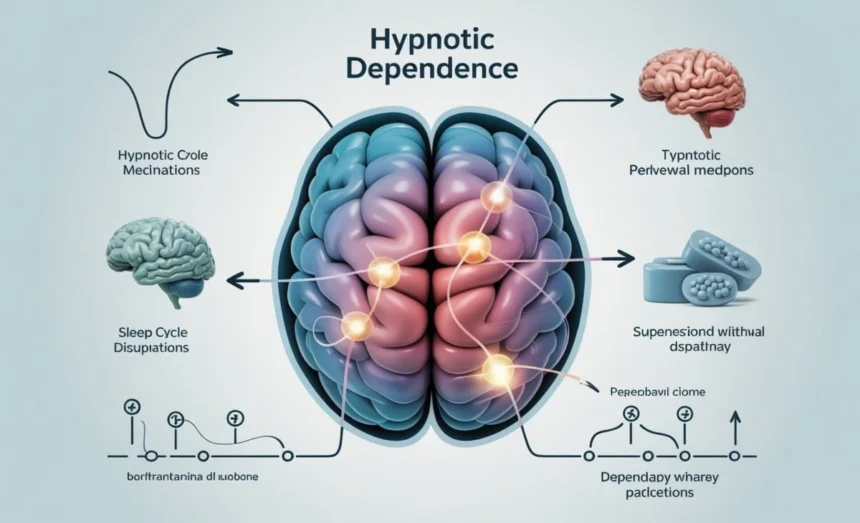Hypnotic drug dependence has become a growing concern as more individuals turn to sleep aids to manage insomnia, anxiety, or chronic restlessness. While these medications can provide short-term relief, long-term use can lead to both physical and psychological reliance. Seeking professional support through hypnotic drug dependence treatment is often the most effective way to achieve lasting recovery.
Hypnotics, which include medications like benzodiazepines, barbiturates, and non-benzodiazepine sleep aids, are designed to induce relaxation and sleep. However, their calming effects can quickly become habit-forming when used without medical supervision. Over time, tolerance builds, requiring higher doses for the same results, which increases the risk of dependence and withdrawal challenges.
Addressing hypnotic drug dependence requires more than just discontinuing the medication. It involves understanding its effects, the reasons behind usage, and developing personalized strategies for recovery. Families often play an essential role in recognizing the warning signs early and encouraging their loved ones to seek professional help before the situation escalates.
The Science Behind Hypnotic Drugs
Hypnotic drugs primarily act on the central nervous system by enhancing the effects of gamma-aminobutyric acid (GABA), a neurotransmitter responsible for calming brain activity. By amplifying this effect, these drugs slow down mental and physical functions, promoting sleep and relaxation.
While short-term use may be medically appropriate, prolonged consumption often alters brain chemistry. This shift makes it increasingly difficult for individuals to sleep naturally without medication. Dependence develops when the brain and body adapt to the drug’s presence and require it to function normally.
Research also suggests that hypnotic drug dependence may impact cognitive performance, mood regulation, and even emotional stability. Many individuals who struggle with sleep disorders or anxiety find themselves trapped in a cycle where they use these medications for relief, only to develop deeper reliance over time.
Understanding the science behind these medications allows both individuals and healthcare professionals to develop safe tapering plans and long-term strategies for recovery that focus on restoring natural sleep cycles and mental balance.
Signs and Symptoms of Dependence
Recognizing the early signs of hypnotic drug dependence is crucial for timely intervention. The symptoms may vary based on the type of drug, dosage, and duration of use, but often include increasing tolerance, cravings, and emotional instability.
A person may begin to take the medication earlier in the evening, increase the dose without consulting a physician, or experience anxiety when doses are missed. Physical symptoms like dizziness, confusion, headaches, and memory issues can also develop. These side effects not only disrupt daily functioning but may also put the individual at risk of accidents or cognitive decline.
Behavioral changes are another red flag. People struggling with dependence might isolate themselves, neglect responsibilities, or hide their medication use. When these warning signs appear, professional evaluation becomes necessary. Early intervention through structured detox and therapy programs can prevent severe withdrawal complications and support safe recovery.
Health Implications of Long-Term Use
Long-term use of hypnotic drugs can significantly affect both mental and physical health. Prolonged dependence has been linked to cognitive impairment, emotional instability, and increased risks of depression and anxiety. Physically, these drugs can weaken the immune system, slow metabolism, and lead to sleep pattern disruption even when medication is taken consistently.
In severe cases, dependence can cause respiratory issues, liver strain, and cardiovascular stress, especially when combined with other depressants like alcohol. The constant alteration of brain chemistry also impacts memory retention and focus, making everyday tasks increasingly difficult.
From a psychological perspective, individuals often experience a reduced ability to manage stress naturally. Instead of relying on coping skills or healthy routines, they depend on medication to achieve relaxation or rest. Breaking this cycle requires both professional detoxification and emotional support, which form the cornerstone of effective recovery.
Common Hypnotic Drugs and Their Effects
The term hypnotic drug dependence covers a wide range of substances prescribed to induce sleep or reduce anxiety. Common examples include benzodiazepines like temazepam and diazepam, non-benzodiazepine hypnotics such as zolpidem and zaleplon, and barbiturates used in specific medical contexts.
Each drug category affects the brain differently but shares similar potential for dependence. Benzodiazepines, for instance, act quickly and provide noticeable sedation, which can make them appealing to those struggling with insomnia. Non-benzodiazepine drugs, often perceived as safer, can still lead to misuse when taken outside of prescribed guidelines.
The effects of long-term use can be subtle at first but often escalate. Individuals may experience difficulty concentrating, daytime fatigue, or emotional flatness. As dependence deepens, these symptoms intensify, leading to disrupted daily routines and reduced overall well-being. Recognizing these patterns early allows for timely treatment and greater success in long-term recovery.
Approaches to Overcoming Dependence
Successfully addressing hypnotic drug dependence involves a combination of medical supervision, therapy, and lifestyle adjustments. A medically managed detox program is often the first step, allowing the body to eliminate the drug safely while minimizing withdrawal symptoms.
Therapeutic interventions, such as cognitive-behavioral therapy (CBT), help individuals identify underlying emotional triggers that contribute to misuse. Therapists also guide clients in developing healthier coping mechanisms to manage stress and sleep difficulties naturally.
Lifestyle changes—such as improving sleep hygiene, reducing caffeine and alcohol intake, and establishing consistent bedtime routines—also play a major role in recovery. Complementary therapies like mindfulness, yoga, and meditation can help reduce anxiety and promote inner calm, enhancing overall treatment outcomes.
Combining professional medical care with psychological support provides a holistic path to recovery, ensuring individuals not only stop using hypnotic drugs but also regain control over their physical and emotional health.
Support Systems and Resources Available
Support systems are vital in every stage of recovery. Whether through family involvement, therapy groups, or community-based programs, having consistent emotional support increases motivation and accountability. Many individuals benefit from peer-led recovery meetings, where they can share experiences and learn from others on similar journeys.
Professional facilities also provide access to aftercare programs that help maintain progress post-detox. These services often include relapse prevention strategies, continued counseling, and structured activities that reinforce healthy living habits.
Families can play a transformative role by creating an environment of understanding rather than judgment. Encouraging open communication and consistent support reduces stigma and promotes long-term recovery success.
For individuals and families seeking trusted care, Visalia Recovery offers specialized programs tailored to each client’s needs, focusing on healing both the body and mind through compassionate treatment and evidence-based practices.
Building a Drug-Free Future
Recovery from hypnotic drug dependence is a gradual but achievable journey that requires commitment, patience, and professional support. By understanding the science behind dependence, recognizing its signs, and embracing structured treatment approaches, individuals can break free from reliance and rediscover natural wellness.
Visalia Recovery remains dedicated to guiding individuals and families through this process, offering compassionate care and structured programs that pave the way for lasting transformation and a healthy, drug-free future.







